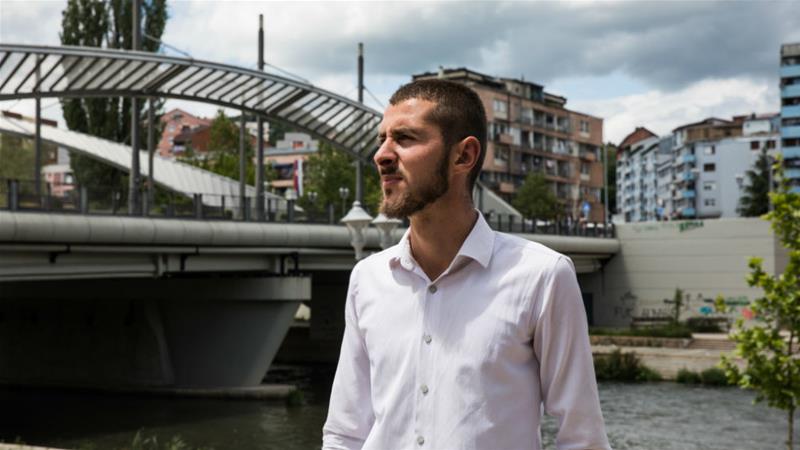Home » World News »
Kosovo raids spark anger, division in Mitrovica
Serbs feel targeted by authorities in the northern city, where a river separates them from ethnic Albanians.
Mitrovica, Kosovo – Just north of the bridge over the Iber river that splits the ethnically divided city of Mitrovica in northern Kosovo, life seems normal. Locals mill around the outdoor cafes lining the pedestrian street, drinking coffee in the warm morning sun and enjoying the day. At one table, a group of Kosovo Serb police officers are gathered.
Three days ago, anti-corruption raids in north Kosovo and elsewhere in the country saw more than 20 arrests, with Kosovo police officers and citizens alike swept up and detained. People here have gotten used to the occasional chaos and, while life quickly returns to normal, a sense of anger endures.
As the raid began early Tuesday morning, sirens – a holdover from those used during the NATO bombings in 1999 – alerted the 12,000 residents of North Mitrovica that something was about to happen.
“It was terrifying because you are thinking someone is attacking you from all sides and you don’t know what to do,” Jovana, a 21-year-old student, told Al Jazeera. “Should you go to work? Should you go to lectures?”
North Mitrovica has a small population, and Jovana asked us not to publish her full name, as she does not want to be targeted.
She does not agree with how the police operation was handled, especially in the Serb-majority municipality of Zubin Potok, where cars and other property were destroyed during the raid against suspected smuggling and organised crime.
“Everything was intended to create some kind of fear and tension – and we are somehow used to living 20 years like this, with tension and this catastrophic feeling,” she said. “I think that they should do things more properly, not in that way, to solve problems.”
‘These things happen all the time’
Another local Serb, 26-year-old economics student Stefan (not his real name), said that while Kosovo police had the authority to arrest people suspected of organised crime, Tuesday’s operation “was too brutal”.
“People were hurt and beaten,” he said.
“I don’t support crime, crime is crime all around the world, but this was like some kind of showing of muscle from the police in Pristina and that’s why we protested,” Stefan said, referring to the peaceful rally held in North Mitrovica on Wednesday.
Stefan believes Kosovo Serbs were targeted in the operation as a display of Pristina’s “dominance”.
“[They want to say] ‘this is our place, this is our territory, we can do whatever we want with the power of the police, army.’
“Today is a little more peaceful than the [past few] days, but it has been like this for 20 years – every year these things happen all the time. People are very stressed about the situation [for Serbs living in Kosovo].”
On the other side of the Iber river is South Mitrovica, where ethnic Albanians are the majority among the much larger 72,000 population.
“I felt happiness because the law was implemented,” Shkelzen Musa, a 23-year-old mason, told Al Jazeera on the south side of the bridge. “[Smuggling of illegal] contraband and other shady things were stopped.”
“I don’t feel happiness because they’re Serbs; I feel happiness that crime was fought in Mitrovica.”
This is not the first time Kosovo police have conducted raids in the north of the city. In 2016, dozens of Serb, Albanian and Bosniak traffic police officers were arrested and accused of accepting bribes.
While there had been reports that Serbian troops had been deployed close to the border with Kosovo, that never happened, according to Vincenzo Grasso, spokesperson for KFOR, NATO’s 20-year-old peacekeeping mission here.
KFOR’s mandate is to maintain a safe and secure environment and freedom of movement for all citizens in Kosovo. The NATO mission is in regular contact with Serbian forces across the nearby border. Serbian troops were, instead, put on “high alert” following the raid.
“We were ready to intervene if necessary, but it was not the case,” Grasso said.
“It was an operation against allegedly corrupt policemen and civilians,” he added. “It was a legitimate operation, there was no reason to hinder the activities of the police against criminality, this is for the benefit of everybody.”
Grasso confirmed that the current situation in Kosovo remains “under control”.
Back in North Mitrovica, residents such as Jovana say they are exhausted and just want to move on with their lives.
“I think if the next [police operation] comes, people will be even more confused – but we are somehow used to it. We are adaptable.
“We need to work or do whatever we need to try not to be so impacted by all these things.”
Source: Read Full Article



